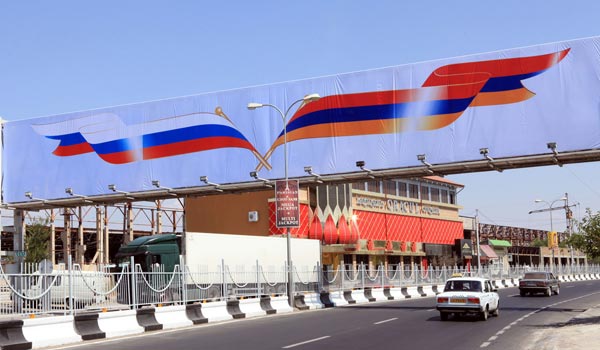
Russian-Abkhazian Strategic Partnership Agreement Puts Pressure on Armenian Government
Publication: Eurasia Daily Monitor Volume: 11 Issue: 221
By:

Implications related to the signing of the Russo-Abkhazian Agreement on Alliance and Strategic Partnership, on November 24, have been reverberating across the region, and have had profound effects on Armenia. For one thing, the agreement again stimulated a discussion about the possible restoration of the railway link between Russia and Georgia via Abkhazia. For Yerevan, the possible reestablishment of this railway route, which would allow Armenia to ship heavy cargo to Russia via Georgian territory, is considered particularly desirable. The capacity of the existing north-south road connection between Armenia and Russia is limited; and during the winter, the road is often closed for weeks or even months because of the harsh climate conditions and heavy snowfall.
The possibility of restoring this north-south railway corridor through Abkhazia has been suggested on a number of occasions, including during Eduard Shevardnadze’s tenure as the president of Georgia in the early 2000s. However, the desirability of such an arrangement was mostly underlined by Russian and Armenian sources; the Georgians remained skeptical. And while, in 2012, Georgia’s newly appointed State Minister for Reintegration Paata Zakareishvili also intimated that the railway’s operation could be resumed under certain conditions (Apsny.ge, November 13, 2012), in the end no practical steps followed.
Currently, any agreement on this railroad corridor has become even less likely because of the recent Russo-Abkhazian strategic partnership pact, which Tbilisi considers a step toward the complete annexation of Abkhazia by Russia (see EDM, October 29). And despite some news in the Russian media to the contrary, most Armenian experts and politicians now consider any further movement on the railway issue extremely unlikely (Tert.am, November 28; Arminfo.am, December 1).
It is not clear how the Armenian authorities may react if Russia invites Abkhazia to join the Eurasian Economic Union (EEU), which is set to enter into force on January 1, 2015. While Russia does not admit an intention to annex Abkhazia, the Russo-Abkhazian agreement provides that Abkhazia’s defense forces, law enforcement agencies, de facto borders (including the border with Georgia), customs service, healthcare, social services, etc. will be under direct Russian control. And within a three-year period, Abkhazia’s legal framework must be harmonized with the EEU’s customs regulations. In addition, the agreement mentions that one of the main directions of the Russo-Abkhazian “strategic partnership” is “creating the conditions for full-fledged participation of the Republic of Abkhazia in the integration processes in the post-Soviet area initiated and/or supported by the Russian Federation” (Kavkazsky Uzel, November 24).
Until now, the Armenian authorities have attempted to avoid taking any actions that would result in the deterioration of bilateral relations with Georgia. However, just as Russian pressure last year compelled Armenia to seek EEU membership, it remains to be seen whether the government in Yerevan will be able to withstand similar Russian demands concerning Abkhazia’s eventual membership in the Eurasian integrationist bloc. Analysts have argued that Abkhazia’s full membership in the EEU would mean the de facto recognition of Abkhazia’s independence by the bloc’s members (currently Russia, Belarus and Kazakhstan, but soon also probably Armenia). And though Abkhazia’s entry is, for now, quite unlikely due to Belarus’s and Kazakhstan’s expected resistance, Armenia may be pushed to support Sukhumi’s accession, thereby endangering the heretofore friendly relations between Yerevan and Tbilisi (Tert.am, November 26).
Cargo transit between Armenia and other EEU members remains another unsolved issue. So far, there is no transit agreement between the EEU and Georgia, and transit tariffs may be increased, especially if Armenia is compelled by the bloc’s rules to raise its customs duties on Georgian products. Indeed, EEU regulations may, in all likelihood, result in Armenia having to renounce its free trade agreement Georgia (Lragir.am, September 26).
A recent article written by Mikhail Chernov—a Russian political scientist, and one of the emissaries who visited Armenia on several occasions to promote the Eurasian Union—points to the possible consequences of current Russian regional policies for Armenia and the broader South Caucasus. According to Chernov, an agreement between Russia and South Ossetia is also in the making, and it suggests even “deeper integration” than the Russo-Abkhazian agreement; both agreements should secure for Moscow the de facto integration of Abkhazia and South Ossetia with Russian and EEU legal, military and customs structures (Lenta.ru, November 7).
Chernov claims that Russia has no immediate intention of fully absorbing these two breakaway Georgian territories. But closer cooperation with them will serve to help solve two main issues for Moscow. First, their further integration will prevent the establishment of North Atlantic Treaty Organization (NATO) military infrastructure in Georgia as well as Georgia’s deeper economic integration with the European Union. Second, it will help secure a transportation route to Armenia in order to obtain a “common border” between Russia and Armenia, increase the potential of the Russian military base in Armenia, and replace the Armenian customs service on the Armenian-Iranian border. Furthermore, Chernov argues, should Georgia suffer political destabilization, Russia would interfere in order to provide stability and security for the population of Georgia’s regions, and “bilateral agreements may also be concluded with regional authorities considered legitimate by the local population and Moscow” (Lenta.ru, November 7). In an interview with a Georgian news agency, Chernov repeated his claims that Russia might militarily interfere in a destabilized Georgia and asserted that, in any case, Russia will need access to Armenia within one or two years. So, he warned, the Georgian government should take Russia’s strategic goals into consideration (Frontnews.ge, November 10).
Many analysts expect that the declining price of oil and the devaluation of the Russian ruble will result in a serious economic recession in Russia, which may induce Vladimir Putin’s administration to retreat from the further use of force, particularly against Ukraine. However, Putin’s address to the Federal Assembly of Russia (see EDM, December 4, 8) and his other official statements rather suggest that the Kremlin’s confrontational policies will continue, and the West will be blamed for Russia’s economic hardship. Under such circumstances, Georgia’s situation will remain insecure; Russian pressure will, thus, remain in place and it may again transform into a military threat. As for Yerevan, considering Armenia’s dependence on Georgia for its Russian-bound transit, the Armenian government will likely seek to avoid any direct engagement in hostile actions against Georgia. However, Yerevan may be unable to prevent the deterioration of its bilateral relations with Tbilisi if Moscow decides to use its influence and networks to stir unrest in Georgia’s Armenian-populated Javakheti region in order to create a pretext for an intervention.




